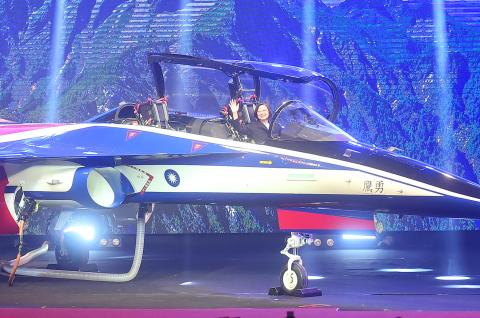President Tsai Ing-wen (蔡英文) yesterday attended the rollout of the first indigenously produced Advanced Jet Trainer at the Aerospace Industrial Development Corp (AIDC, 漢翔航空) factory in Taichung’s Salu District (沙鹿)
The manufacture of the prototype, which the Ministry of National Defense named the AIDC T-5 Yung Ying (勇鷹, “Brave Eagle”), marks a historic milestone for the air force, the nation’s aerospace industry and the administration’s pledge to create a self-sufficient defense industry, Tsai said.
“There have been many challenges, detractors, critics and naysayers on the long journey leading to this day, but the facts show that we were right and our efforts were not in vain,” she said before thanking the ministry, the AIDC and the Chungshan Institute of Science and Technology.

Photo: Liao Yao-tung, Taipei Times
Tsai said that the idea for the indigenous trainer came from a discussion in 2016 with then-AIDC chairman Feng Shih-kuan (馮世寬) when she was campaigning as the Democratic Progressive Party’s (DPP) presidential candidate.
Feng had told her that the AIDC had tried and failed to convince the then-Chinese Nationalist Party (KMT) government to develop a military jet, and that this would have grave consequences for industry in Taiwan, she said.
After becoming president, she made it a priority of her administration to support the design and manufacture of an advanced jet trainer, which also served to revive the aerospace industry, she said.
Since 2017, the trainer program has spent NT$37.7 billion (US$1.22 billion at the current exchange rate) on Taiwanese enterprises, or more than half of its NT$68.6 billion budget, and created 1,200 jobs, she said, adding that the program would create another 800 jobs by 2021.
In response to requests for comment, Institute of National Defense and Security Research senior analyst Su Tzu-yun (蘇紫雲) said that the Advanced Jet Trainer has a dual-purpose platform — both flight and tactical training — which increases air force efficiency and streamlines logistics.
The air force uses the Beechcraft T-34 for basic flight training, the AIDC AT-3 for intermediate flight training and the Northrop F-5 for advanced tactical training, he said.
The Advanced Jet Trainer would replace the AT-3 and the F-5, which the air force plans to retire, he said, adding that having a common platform for flight and tactical training would facilitate training and reduce operating costs.
The Yung Ying and the AIDC’s Indigenous Defense Fighter have interchangeable parts, so mass-producing the Advanced Jet Trainer would increase the supply of spare parts for both, he said, adding that the jets use a Honeywell/ITEC F124 engine, which is 55 percent domestically produced.
While information about the Advanced Jet Trainer’s avionics have not been made public, the jet is believed to have a glass cockpit that allows different flight characteristics to be simulated via augmented reality technology, he said.
The trainer prototype was dubbed the XAT-5, suggesting that the Advanced Jet Trainer is capable of bombing or launching missiles at ground troops, motor vehicles and ships, he said.
Producing armaments domestically is considered to increase the value of the allocations by a factor of 2.5, meaning that the trainer program should add NT$150 billion to the economy, he added.
Additional reporting by CNA

SECURITY: As China is ‘reshaping’ Hong Kong’s population, Taiwan must raise the eligibility threshold for applications from Hong Kongers, Chiu Chui-cheng said When Hong Kong and Macau citizens apply for residency in Taiwan, it would be under a new category that includes a “national security observation period,” Mainland Affairs Council (MAC) Minister Chiu Chui-cheng (邱垂正) said yesterday. President William Lai (賴清德) on March 13 announced 17 strategies to counter China’s aggression toward Taiwan, including incorporating national security considerations into the review process for residency applications from Hong Kong and Macau citizens. The situation in Hong Kong is constantly changing, Chiu said to media yesterday on the sidelines of the Taipei Technology Run hosted by the Taipei Neihu Technology Park Development Association. With

A US Marine Corps regiment equipped with Naval Strike Missiles (NSM) is set to participate in the upcoming Balikatan 25 exercise in the Luzon Strait, marking the system’s first-ever deployment in the Philippines. US and Philippine officials have separately confirmed that the Navy Marine Expeditionary Ship Interdiction System (NMESIS) — the mobile launch platform for the Naval Strike Missile — would take part in the joint exercise. The missiles are being deployed to “a strategic first island chain chokepoint” in the waters between Taiwan proper and the Philippines, US-based Naval News reported. “The Luzon Strait and Bashi Channel represent a critical access

CARROT AND STICK: While unrelenting in its military threats, China attracted nearly 40,000 Taiwanese to over 400 business events last year Nearly 40,000 Taiwanese last year joined industry events in China, such as conferences and trade fairs, supported by the Chinese government, a study showed yesterday, as Beijing ramps up a charm offensive toward Taipei alongside military pressure. China has long taken a carrot-and-stick approach to Taiwan, threatening it with the prospect of military action while reaching out to those it believes are amenable to Beijing’s point of view. Taiwanese security officials are wary of what they see as Beijing’s influence campaigns to sway public opinion after Taipei and Beijing gradually resumed travel links halted by the COVID-19 pandemic, but the scale of

Pope Francis is be laid to rest on Saturday after lying in state for three days in St Peter’s Basilica, where the faithful are expected to flock to pay their respects to history’s first Latin American pontiff. The cardinals met yesterday in the Vatican’s synod hall to chart the next steps before a conclave begins to choose Francis’ successor, as condolences poured in from around the world. According to current norms, the conclave must begin between May 5 and 10. The cardinals set the funeral for Saturday at 10am in St Peter’s Square, to be celebrated by the dean of the College